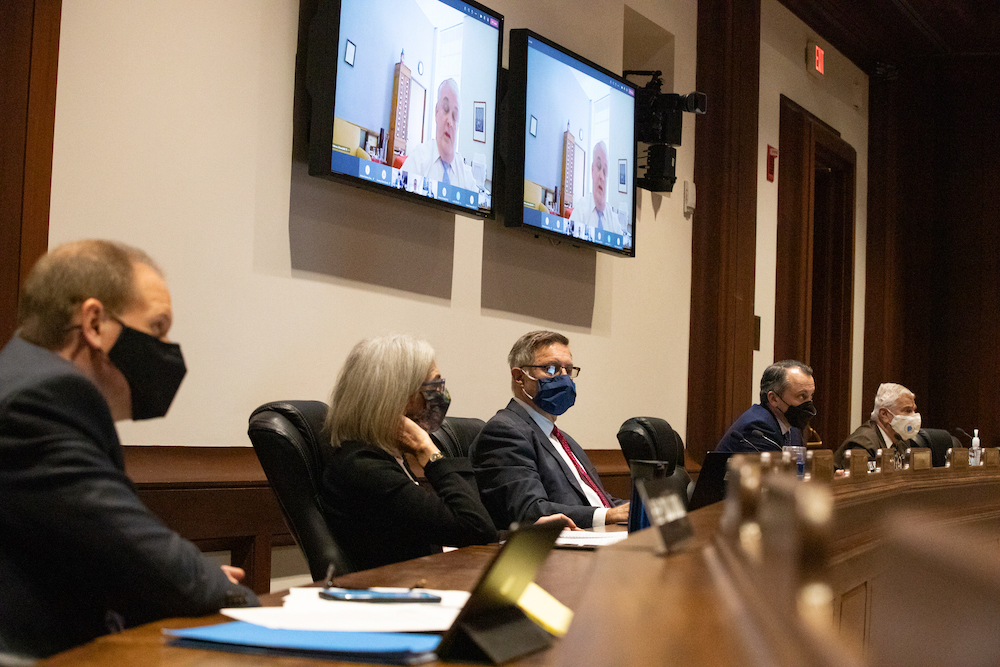latest
Tax Bills May Be Slapped on Small Business Recovery Grants

Thousands of small businesses have received hundreds of millions of dollars in state recovery grants since December, helping them to pay the rent and make payroll, but one top House Democrat said Tuesday he’s worried many of these businesses owners might not know what’s coming — a tax bill.
Rep. Aaron Michlewitz, a Boston lawmaker and chair of the House Ways and Means Committee, raised his concerns over the tax status of the small business recovery grants at the first annual budget hearing on Gov. Charlie Baker’s $45.6 billion spending plan for fiscal 2022.
“The businesses in my district have been very thankful but I don’t think many people know there’s going to be a tax bill down the road,” said Michlewitz, who represents Boston’s North End and parts of other neighborhoods, home to many restaurants.
Administration and Finance Secretary Michael Heffernan told the Ways and Means Committees that the governor’s office is involved in talks with state and federal lawmakers about changing the laws to waive taxes on all state-issued relief payments and some federal Paycheck Protection Program grants.
The combined taxes owed to Massachusetts on the state and federal recovery grants total about $175 million, officials said, and were not included in Baker’s budget.
The hearing was the first of what will be a series in the coming weeks focused on Baker’s budget, which currently relies on $1.6 billion in reserves and would trim state spending by about $300 million, or 0.7 percent, from the current budget levels.
One thing that could change the math on the state budget dramatically is President Joe Biden’s $1.9 trillion COVID-19 relief bill that passed the House last week. The state could receive $4.5 billion in direct aid under the bill, which remains subject to change as it heads to the Senate.
The top Senate Democrat on the budget-writing committee told the administration that lawmakers want to play a “highly constructive and meaningful role” in determining how those billions in potential new federal stimulus funding gets spent.
“We need to think carefully about how we responsibly and carefully use these resources to best position the commonwealth for long-term success,” said Sen. Michael Rodrigues, chair of the Senate Ways and Means Committee.
The Westport Democrat said the biggest challenge in spending those funds and budgeting for fiscal 2022 will be ensuring that the recovery from the pandemic is equitable across the state and economic sectors.
Heffernan said the administration would work with legislators as new federal relief funding became available, but would prioritize reducing the proposed $1.6 billion withdrawal from the state’s “rainy day” fund, which would leave the fund with just $1.1 billion for fiscal 2023 and beyond.
Heffernan also suggested that if Biden does extend the public health emergency through the end of 2021, as his administration has suggested it will, the state will have to delay the redetermination of MassHealth enrollee eligibility that had been planned for the spring.
That will result in higher caseloads and more MassHealth spending than currently projected in the budget, the secretary said, but will also allow the state to continue collecting higher Medicaid reimbursements. Baker’s budget forecast MassHealth spending to decline from $18.2 billion this year to $17.6 billion in fiscal 2022, a 3.4 percent reduction.
“Hopefully, it will not be too bad a hit. We will see,” said Heffernan, who testified for just over an hour.
Baker in late December launched a $668 million small business recovery program, utilizing funds the state received through the federal CARES Act and the Coronavirus Relief Fund. So far, the administration has awarded $563 million to 12,320 businesses to help COVID-19 impacted employers cover payroll, rent and other expenses.
While Congress in December agreed to exempt forgiven PPP loans from federal taxation, a subset of those grants to small businesses that do not pay corporate taxes, but pass revenue through to owners as income could still be taxed at the state level. Some states have chosen to waive taxes on those grants, but in 19 states the funding remains taxable in some form, according to the Tax Foundation.
Massachusetts automatically conforms to federal corporate tax law, but not as it relates to income. Budget officials said that means that without a change in state law small business owners will be liable for about $150 million in taxes on forgiven PPP loans, and between $25 million and $35 million on state grants awarded through the Massachusetts Growth Capital Corporation.
Heffernan said the administration is also talking with U.S. Rep. Richard Neal, the chairman of the House Ways and Means Committee in Congress, about exempting state small business recovery grants from federal income taxes.
“What we’re actively discussing with our counterparts in the Legislature is making the PPP at the income level, which is primarily small businesses, tax free at the state level,” Heffernan said.
In the meantime, Michlewitz said he wants to make sure the business owners who received the grants are aware that the government assistance could be taxed.
“A lot of these people who are getting grants have never gotten a grant before because they’ve never really had to,” Michlewitz said. “I worry that the communication lines, we have to make them strong about what could potentially be coming down the pike.”
Hefferan said the Department of Revenue has information about the tax status of relief grants on its website, and has communicated about it with certified public accountants.
Lawmakers also questioned Baker’s stated commitment to fully fund the first year of the Student Opportunity Act, the implementation of which was paused in fiscal 2021 due to the ongoing pandemic. Before COVID-19 arrived last March, Baker proposed a budget that included a $303 million increase in Chapter 70 school aid to fund the 2019 initiative, but his latest budget included only $198 million.
Heffernan said the formula used by the administration remained the same, but the smaller amount reflected a decline in public school enrollment of about 37,000 students.
He told the committees that enrollment is recalculated every October and if enrollment climbs as districts transition away from remote learning and students return to the classroom, that would be reflected in subsequent-year spending recommendations.
Both Michlewitz and Rodrigues said declining rates of new COVID-19 infections, the increased availability of vaccines and the current trend of tax revenues exceeding expectations gives legislators reason to be “hopeful.”
“We have a long road to travel before this crisis is behind us, but we can begin to think about and prepare for what the new normal will look like,” Michlewitz said.






You must be logged in to post a comment Login